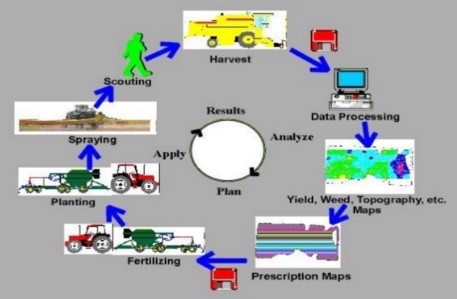Precision Farming in India – Features, Merits, Demerits and Challenges

From Current Affairs Notes for UPSC » Editorials & In-depths » This topic
IAS EXPRESS Vs UPSC Prelims 2024: 80+ questions reflected
The Government of India has established 22 Precision Farming Development Centres (PFDCs) across the country with the goal of developing and disseminating regionally differentiated Precision Farming technologies such as Micro Irrigation and hi-tech agriculture (vertical farming, hydroponics, aeroponics, protected cultivation, plasticulture) and maximising production and productivity per unit area to improve the socio-economic conditions of farmers and end users.
What is Precision Farming?
- Precision agriculture refers to the precise application of agricultural inputs with respect to soil, weather and crop need in order to improve productivity, quality, and profitability in agriculture.
- It is a modern agriculture practice involving the use of technology in agriculture like remote sensing, GPS and Geographical Information System (GIS) for improving productivity and profitability.
- It enables farmers to use crop inputs more efficiently including pesticides, fertilizers, tillage and irrigation water.
- More effective utilization of inputs will bring in more crop yield and quality without polluting the environment and will result in sustainable agriculture and sustainable development.
- Hence precision agriculture is about doing the right thing, in the right place, in the right way, at the right time.

What are the advantages of precision farming?
- It will enhance agricultural productivity and prevent soil degradation in cultivable land resulting in sustained agricultural development.
- It will reduce excessive chemical usage in crop production.
- Water resources will be utilized efficiently under the precision farming.
- GPS allows agricultural fields to be surveyed with ease. Moreover, the yield and soil characteristics can also be mapped.
- Dissemination of information about agricultural practices to improve quality, quantity and reduced cost of production in agricultural crops.
- It will minimize the risk to the environment particularly with respect to the nitrate leaching and groundwater contamination by means of the optimization of agro-chemical products.
- Non-uniform fields can be sub-divided into smaller plots based on their unique requirements.
- It provides opportunities for better resource management and hence reduce wastage of resources

What are the disadvantages of precision farming?
- High capital costs may discourage farmers to not adopt this method of farming.
- Precision agriculture techniques are still under development and requires expert advice before actual implementation.
- It may take several years before the actual collection of sufficient data to fully implement the system.
- It is an extremely difficult task particularly the collection and analysis of data.
How could India benefit from precision farming?
- Refinement and wider application of precision agriculture technologies in India can help in reducing production costs, increasing productivity and better utilization of natural resources.
- It has the ability to revolutionalize modern farm management in India through improvement in profitability, productivity, sustainability, crop quality, environmental protection, on-farm quality of life, food safety and rural economic development.
- Site-specific application of irrigation in wheat of Punjab and Haryana, pesticides in cotton and fertilizers applications in oil palm plantation in South India, and coffee and tea garden of eastern India can highly reduce production costs and also reduce environmental loading of chemicals.
- It can increase the efficiency of irrigation efficiency when water resources are low.
- Farmers can use forecast and mitigate problems like water stress, nutrient deficiency, and pests/diseases.
- It also increases opportunities for skilled employment in the agriculture sector and also provides new tools for evaluating multifunctional aspects including non-market functions.
- It has the essential role in the monitoring of greenhouse conditions in agricultural fields
Challenges in adopting precision farming in India
- The adoption of precision farming in India is yet in the nascent stage due to its unique pattern of land holdings, poor infrastructure, lack of farmers inclination to take the risk, social and economic conditions and demographic conditions
- The small size of landholdings in most of the Indian agriculture limits economic gains from currently available precision farming technology.
Way forward
Rapid socio-economic changes such as economic growth, urbanization, and energy consumption are creating new opportunities for the application of precision farming in India. Instead of blindly adopting the advanced Precision Agriculture technologies adopted by developed countries, India should adopt technologies based on the need of the socio-economic condition of the country.
If you like this post, please share your feedback in the comments section below so that we will upload more posts like this.


Article is useful for new aspirants.
Thank you Sir
LOVE FROM KASHMIR